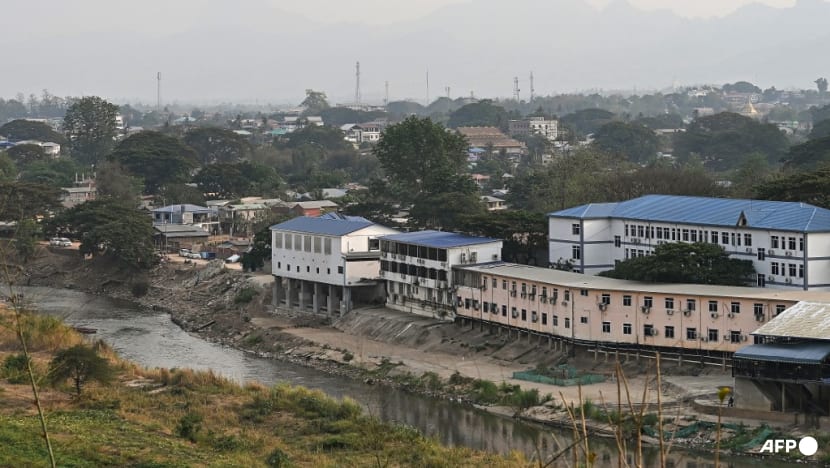Thailand cuts power to Myanmar border regions to fight scam centres

A general view of Myanmar's Myawaddy town is seen from across the Thai side in Mae Sot district on Apr 11, 2024. (File photo: AFP/Manan Vatsyayana)
BANGKOK: Thailand cut cross-border electricity supplies to five locations in Myanmar on Wednesday (Feb 5), in an effort to stamp out online scam centres blamed for scaring away Chinese tourists.
Scam compounds have mushroomed in Myanmar's lawless borderlands, run by criminal gangs and staffed by foreigners trafficked and forced to work swindling their compatriots in an industry analysts say is worth billions of dollars.
Beijing has grown increasingly concerned about the centres as many of those involved - both victims and perpetrators - are Chinese.
"Thailand has stopped the electricity supply to Myanmar in five locations based on the decision of the National Security Council," Interior Minister Anutin Charnvirakul told reporters.
Transmission was cut at two points in Mae Sai in the north, two in Mae Sot in the west and one at Three Pagodas Pass, also in the west.
Anutin said electricity sales to Myanmar at these five locations earned Thailand around 50 million baht (US$1.5 million) a month.
"The electricity supply is not being stopped because the companies violated the contract, but because the electricity is being misused for scams, drugs and call centres," Anutin said.
"No one can accuse Thailand now of being part of supporting illegal businesses."
The move came as Prime Minister Paetongtarn Shinawatra travelled to Beijing for talks with President Xi Jinping, with the scam centres likely to be on the agenda.
"What happened has had a huge impact on many Thai people and the image of the country," she said.
The scam compounds have come into renewed focus after Chinese actor Wang Xing was abducted after arriving in Thailand last month. He was later freed by Thai police who found him in Myanmar.
Fears among Chinese tourists of being kidnapped and forced to work in scam centres was blamed for a sharp drop in visitor numbers over the Lunar New Year holiday last week.
China is a hugely important market for Thailand as it seeks to rebuild its crucial tourism sector after the devastating impact of travel shutdowns during the COVID-19 pandemic.
Deputy Prime Minister Phumtham Wechayachai said the scam centres were a "national security issue".
According to the United Nations, hundreds of thousands of people have been trafficked by criminal gangs and forced to work in scam centres and illegal online operations across Southeast Asia, including along the Thai-Myanmar border. A 2023 UN report estimated the fast-growing operations generate billions of dollars annually.
Myanmar's state-run Global New Light of Myanmar in a rare article on scam centres last month said basic essentials, including power and internet, are not provided by Myanmar but by other countries, in a veiled reference to Thailand.
It said "foreign organisations" were investing in this infrastructure.
Myanmar's military government has since October 2023 repatriated more than 55,000 foreigners, overwhelmingly Chinese, who were forced to work in scam compounds to their home countries, the newspaper said.










